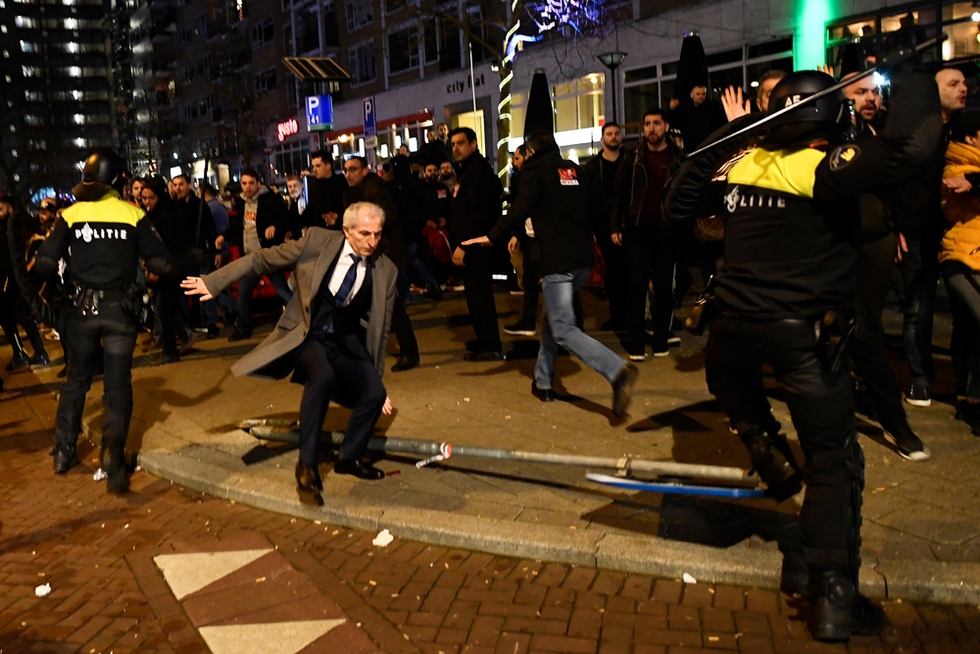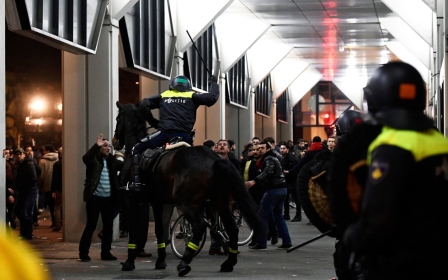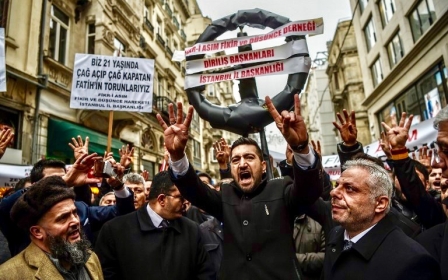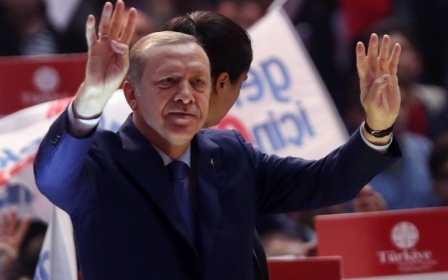Soothing words or night-sticks? The choice facing Turkey and EU

ISTANBUL, Turkey – For about 30 minutes on Sunday morning, the Turkish flag flew atop the Dutch consulate in Istanbul. A Turkish protester had scaled the wall, replaced the Dutch colours, and shouted that God was great.
It was a scene reminiscent of the storming of embassies in Iran, or perhaps the Green Zone in Iraq's Baghdad. It was also one of the milder moments in the ongoing diplomatic scandal between Turkey and European states.
Hours earlier, Dutch riot police had horse-charged Turkish protesters demonstrating outside the Turkish consulate in Rotterdam over the banning of Turkish politicians from campaigning in the Netherlands.
The Turkish president, Recep Tayyip Erdogan, called for sanctions against the Netherlands.
"How will they justify these actions against our minister for family affairs, Fatma Betul Sayan? If I have a passport, I will go where I want as a diplomat or as a person.
"This is the mentality of Nazism and fascism. Where are you European Union?
"These acts will not go unanswered. Those who mistreated my minister will pay. Those who let dogs loose on my citizens will pay," he said.
While calling for a de-escalation the Dutch prime minister, Mark Rutte, on Sunday said his country would not give in to "blackmail," and called on Erdogan to apologise for his remarks.
Deporting ministers, denying landing rights, sealing off each other's diplomatic representations, battering protesters with night-sticks, and calling each other's governments Nazis and dictators is not what is normally expected from purported allies.
Yet this appears to be the new norm, putting Turkey at odds with a host of European countries, including Germany, the Netherlands, Austria, Switzerland and Sweden.
Denmark's prime minister, Lars Lokke Rasmussen, on Sunday proposed that a rally by his Turkish counterpart Binali Yildirim should also be cancelled. This is not going away.
Yalim Eralp, a retired Turkish diplomat who has served as Turkey's ambassador to NATO, Washington and the UN, said domestic election concerns are trumping normal diplomatic protocol.
"These western European countries fear that Turkey is trying to bring its domestic problems into their countries," he told Middle East Eye.
"And we need to view these developments in light of the rise of right-wing parties there with elections on the horizon for many of those countries."
However, the blame for this diplomatic crisis is not all one-sided, said Eralp.
"The Turkish government is also trying to portray itself as besieged by Europe and looking for the votes of Europe-based Turks for the upcoming referendum," he said, referring to a vote to be held on 16 April that could give President Erdogan increased powers and longer tenure in office.
The upcoming referendum in Turkey over constitutional changes that would usher in an executive presidency system is set to be a close-run contest, pushing the government to campaign more strongly than before outside Turkey.
The measures taken by these European states vis-a-vis Turkish officials have been condemned by most of Turkey's political parties regardless of their position on the upcoming referendum.
But questions are also being asked about the legality and appropriateness of campaigning for a specific political party while travelling abroad as representatives of the Republic of Turkey.
"This is a sensitive issue. The Turkish government is right and to a limited extent the Europeans as well," said Eralp.
"Protocol demands that permission be obtained before holding such gatherings in foreign countries. This is the same everywhere."
The Netherlands, too, is set to go to the polls, with a general election on Wednesday that could increase the political presence of far-right, ultra-nationalist Geert Wilders.
The Turkish foreign minister, Mevlut Cavusoglu, who was denied landing rights in the Netherlands, said the Dutch had pleaded with him to postpone his visit to stop him playing into Wilders' hands.
He said that could have been an acceptable request, but the Dutch then started making unreasonable demands and made him determined to travel to the Netherlands at a time of his own choosing.
Cavusoglu and a host of other high-ranking Turkish officials, have slammed the actions of these countries and have said they expect the EU, which has lectured Turkey on freedoms, to strongly back Ankara in these disputes.
"We will retaliate 10-fold to these shameful and reprehensible Dutch actions," said Cauvusoglu in Metz, France, on Sunday.
"The Dutch will have to apologise officially in writing if we are to even consider going back to normal with them. We also want to hear the Europeans condemn these fascist-like actions of the Dutch."
Turkey-Europe ties at crossroads
The events of the past fortnight mark a new low in already strained ties. Turkey and many European countries – France during Nicolas Sarkozy's time as president, Germany during Angela Merkel's period as chancellor - have been trading sharp rebukes for much of the past decade.
Ankara has all along accused Europe of hypocrisy and Islamophobia by keeping it waiting at the EU's door while other less deserving countries are admitted.
European states say Turkey has backtracked on the most basic of European values, such as democracy, rule of law and freedom of expression.
These differences have so far not deterred the two sides from working together, for instance in a controversial migrant deal reached between Turkey and the EU last March.
But as the attacks intensify, there is a real risk of a complete collapse of ties, which would have far-reaching consequences.
The long-term future of Turkey-EU ties now lies firmly in the hands of Turkish officials
- Yalim Eralp, retired Turkish diplomat
Modern Turkey has firmly rooted itself to the West and its steps in the conflicts of the Middle East, except for the past few years, have largely been based on that orientation.
A Turkey not anchored to the West would leave Europe without a buffer separating it from the world's current conflict zones.
Turkey, meanwhile, faces the serious threat of being placed once again under the EU's "monitoring process", which would define Ankara's democracy as the lowest standard possible and place a definite block on entry to the union.
The Parliamentary Assembly of the Council of Europe, PACE, is assessing a monitoring report which cited a "serious deterioration of the functioning of democratic institutions" in Turkey. A decision to act on that report comes next month.
Talip Kucukcan, an MP from the ruling Justice and Development Party (AKP) and head of the Turkish delegation to the PACE, slammed the report in a statement, saying it was full of "errors" and incompatible with the "values" of the Council of Europe.
Turkey was under a monitoring process in the 1990s but removed in 2004. It would become the first country to have monitoring reinstated if PACE acts.
The risk of badly damaging ties with the EU in the long term also exists if the bloc doesn't respond to the actions of the Dutch, Germans and others, or tries to justify them.
Diplomatic niceties have been discarded for the moment as Ankara reacts furiously to the violation of basic diplomatic protocols.
For Eralp, the retired diplomat, that Turkish reaction is the key.
"The long-term future of Turkey-EU ties now lies firmly in the hands of Turkish officials after these recent developments," he said.
"It all depends on whether they will want to continue to have ties or not."
This article is available in French on Middle East Eye French edition.
New MEE newsletter: Jerusalem Dispatch
Sign up to get the latest insights and analysis on Israel-Palestine, alongside Turkey Unpacked and other MEE newsletters
Middle East Eye delivers independent and unrivalled coverage and analysis of the Middle East, North Africa and beyond. To learn more about republishing this content and the associated fees, please fill out this form. More about MEE can be found here.





